
Current Events
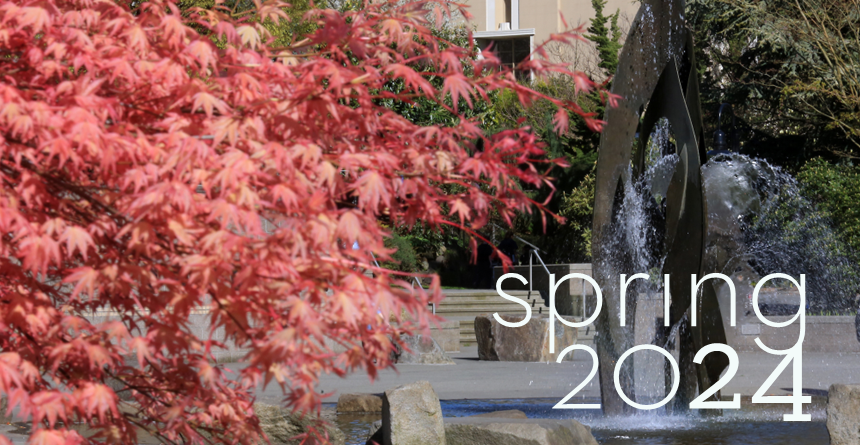
One of our goals as a Center is to engage SU faculty in conversation around the deeper questions of academic practice, based on national and international research into higher education. Events are open to ALL SU faculty.
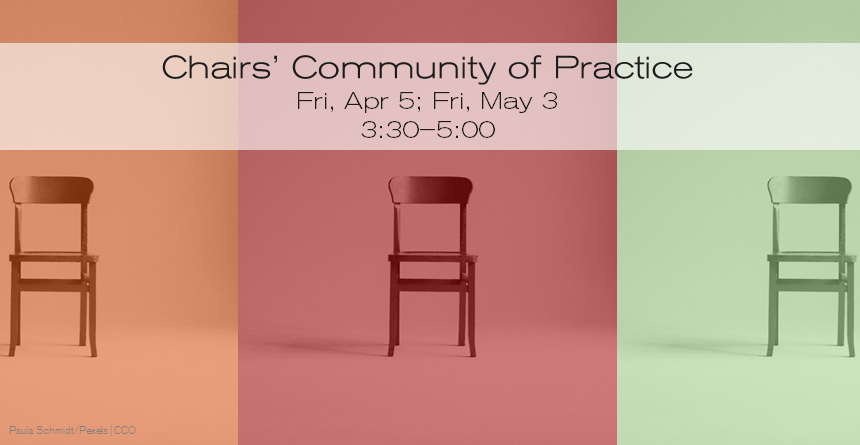
-
24SQ Chairs CoP - details
-
The Chairs' Community of Practice is open to all current department chairs and chairs-elect, plus program directors and directors-elect who have faculty reporting to them directly (for example for performance reviews).
We gather twice per quarter.
Further details and how to register are available on the Community of Practice page here.
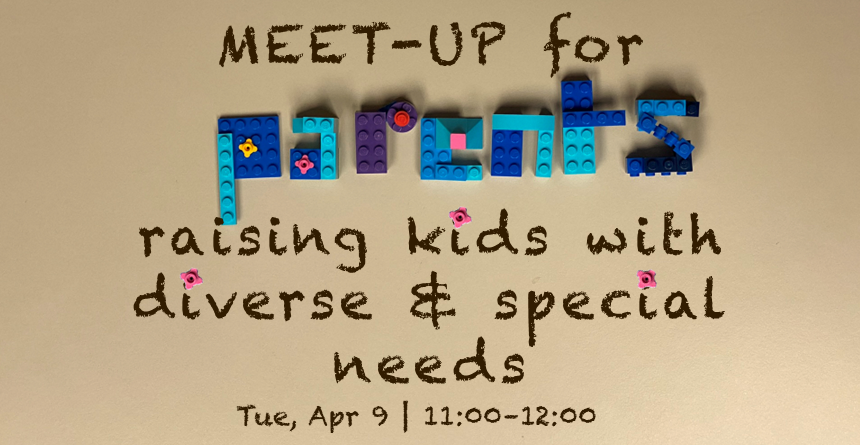
-
24SQ Parents raising kids with diverse and special needs - details
-
Meet-up Event
Faculty and staff meet-up for parents raising kids with diverse and special needs
Tue, Apr 9 | 11:00–12:00 | Via Zoom | Zoom link provided upon registration
Co-sponsored by the Center for Faculty Development and the SU Faculty & Staff Parents' Group
Facilitated by Brooke Gialopsos (Criminal Justice, Criminology, & Forensics)
The Center for Faculty Development, in partnership with the SU Faculty & Staff Parents' Group, will offer a one-time meeting for faculty and staff parents who are raising school-aged kids with diverse and special needs. The challenges of parenting while maintaining a schedule of teaching, research, and/or service to the university is well-known. Raising children with diverse and special needs can challenge our attempts to balance the demands of work and the additional needs of our children. There are many of us out there and we have found one another through the invaluable connections forged among parents in our existing affinity groups. We hope that you will join us for this one-time meet-up to empathize, problem-solve, champion, and celebrate the unique path of those raising children with diverse and special needs.
We will collate contact information post-event to allow participants to keep in touch with one another. If you cannot make this meeting but would like to make a connection with other parents, please contact faculty-development@seattleu.edu.
Please note that ALL faculty parents are welcome to join the Center for Faculty Development’s other Parents’ Affinity Group sessions, open to all faculty parents with school-aged children. A broader support network can be found in the SU Faculty and Staff Parents' Group on MS Teams. These groups are how we found one another in the first place!
How could this be helpful?
The psychological benefits of convening groups of people around common identities and experiences are well known. Research on affinity groups has shown that they enhance agency and optimism, while also providing access to beneficial information and support.
Aims of the meet-up
At its most basic level, we hope that this meet-up offers a space where you can feel less isolated in your experience. We hope to foster a community of support amongst parents raising kids with diverse and special needs, where they can share experiences, offer suggestions, and explore how to navigate shared challenges.
» Register
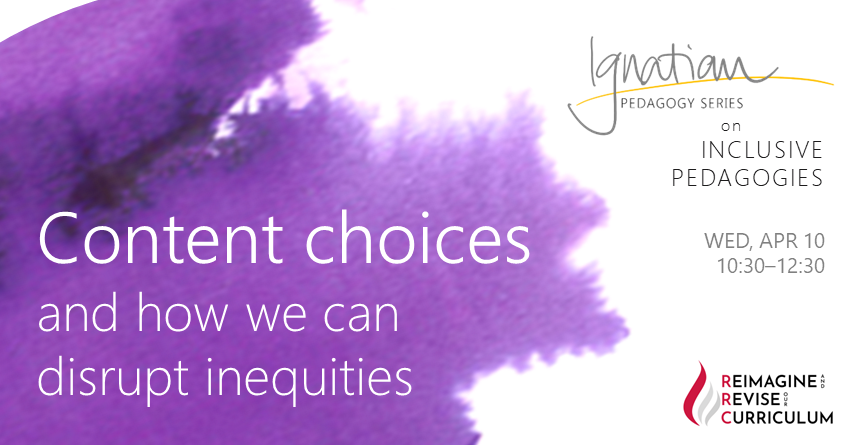
-
24SQ IPS-IP Content Choices - details
-
Ignatian Pedagogy Series: Inclusive Pedagogies
Content choices – and how we can disrupt inequities
Wed, Apr 10 | 10:30–12:30 | Via Zoom | Zoom link provided upon registration
Co-sponsored by the Center for Faculty Development, the Center for Jesuit Education, and the Office of Diversity & Inclusion
Co-facilitated by Andrea Verdan (Center for Faculty Development) and Maureen Feit (Nonprofit Leadership; Provost Fellow for Racial and Economic Justice)
As in winter quarter, this spring we are offering four individual sessions that combine to make the Ignatian Pedagogy Series on Inclusive Pedagogies. As a participant in this session, you will
- Explore what the higher education literature and Ignatian pedagogical principles teach us about inclusive pedagogies, with a clear focus on racial equity.
- Reflect on the interplay between the personal and the social as they relate to racial justice.
To meet you where you are in your own learning, register for the sessions that are most relevant to you; you do not need to register for all sessions.
In this session, you will contemplate these questions:
- How does the culture of your discipline impact the content that you teach?
- What might you already be doing in your teaching practice that supports or disrupts inequities?
- As a teacher, how can you incorporate voices, perspectives, and content into your classes to disrupt inequities?
At the conclusion of this session, you will be asked to complete a short, written reflection assignment.
Andrea Verdan, Associate Director for Term Faculty in the Center for Faculty Development facilitates the Ignatian Pedagogy Series. For this session, she will be joined by Maureen Feit, Director and Assistant Professor of Nonprofit Leadership and Provost Fellow for Racial and Economic Justice. This series is co-sponsored by the Center for Jesuit Education and the Office of Diversity & Inclusion.
If you have any questions about the Ignatian Pedagogy Series, please email faculty-development@seattleu.edu or Andrea Verdan (verdana@seattleu.edu).
» Register
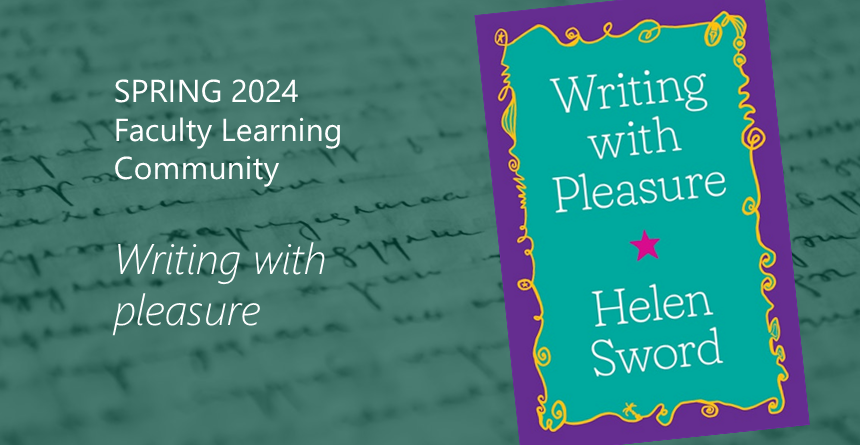
-
24SQ FLC Writing with Pleasure - details
-
Faculty Learning Community
Writing with Pleasure
Narratives in the Academy often describe writing as a painful chore, rather than the pleasurable challenge we might all hope for. As an antidote, Helen Sword’s Writing With Pleasure empowers us – whether our writing is academic, professional, or creative – to reframe our negative emotions about writing and reclaim positive ones.
Ever a fan of mnemonics, Sword invites us to step into our “WriteSPACE”—a space of pleasurable writing that is
- Socially balanced,
- Physically engaged,
- Aesthetically nourishing,
- Creatively challenging, and
- Emotionally uplifting.
To do this, Sword weaves together cutting-edge findings in the sciences and social sciences with compelling narratives gathered from nearly six hundred faculty members and graduate students from across the disciplines and around the world.
In this three-session Learning Community, facilitated by Naomi Hume (Art History), we’ll work our way through the chapters of the book, exploring research-based principles, hands-on strategies, and creative “pleasure prompts” designed to help us ramp up our productivity and enhance the personal rewards of our writing practice, no matter whether we’re writing a scholarly article, an administrative email, or a work of fiction.
Who is it suited to?
This book may be especially suited to early career faculty, as well as to faculty who are seeking to reboot their approaches to their academic, professional, and personal writing.
Writing With Pleasure is 256 pages long, including illustrations by prizewinning graphic memoirist, poet, and academic Selina Tusitala Marsh. Reading will be split across the three sessions to be manageable for participants.
What are the dates?
This learning community meets via Zoom on:
- Fri, Apr 12 | 11:00–12:15
- Fri, May 3 | 11:00–12:15
- Fri, May 24 | 11:00–12:15
» Register
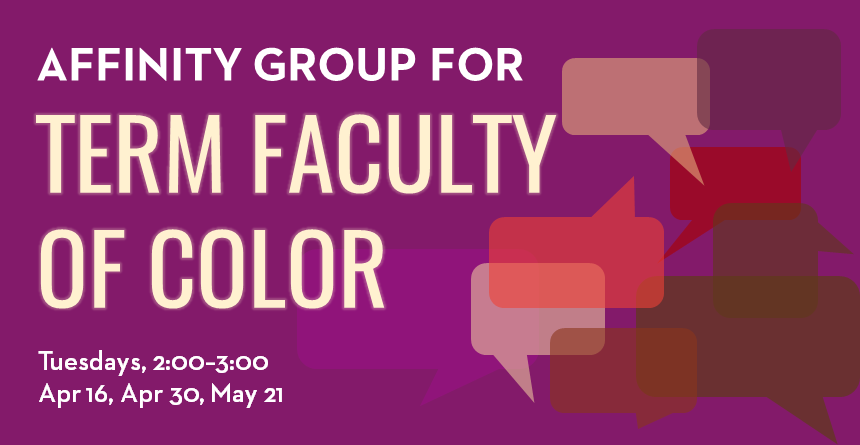
-
24SQ Affinity group for term faculty of color - details
-
Affinity group
Tuesdays: Apr 16, Apr 30, and May 21 | 2:00–3:00 | Via Zoom | Zoom link provided upon registration
Co-sponsored by the Office of Diversity and Inclusion
Facilitated by Andrea Verdan
The Center for Faculty Development and the Office of Diversity and Inclusion are excited to offer an affinity group for term faculty of color. The group is open to both full-time and part-time term faculty of color.
Aims of the group
In this space, participants will aim to support one another in
- sharing experiences to increase community and belonging across campus,
- exploring the impact of race, power, and privilege on our various facets of work, at all stages of our careers, and
- pursuing our work and personal lives with more balance, confidence, and agency.
Why create a group for term faculty of color?
The university’s goal to Promote Inclusive Excellence (RSD Goals 4) calls for initiatives to support diverse faculty to develop and thrive at Seattle University. This includes term faculty of color, whose intersecting identities are minoritized both socially (as a person of color) and professionally (as a non-tenure-track faculty member).
This affinity group aims to foster an equitable faculty culture and structure where all members of the community thrive and experience fulfilling work. Additionally, research on affinity groups shows that they enhance participants’ agency and optimism, while providing access to beneficial information and support. Finally, from our own conversations with members of the SU community, we know that term faculty with marginalized identities need a space where they can discuss their unique experiences in a supportive environment with peers who are similarly situated.
» Register
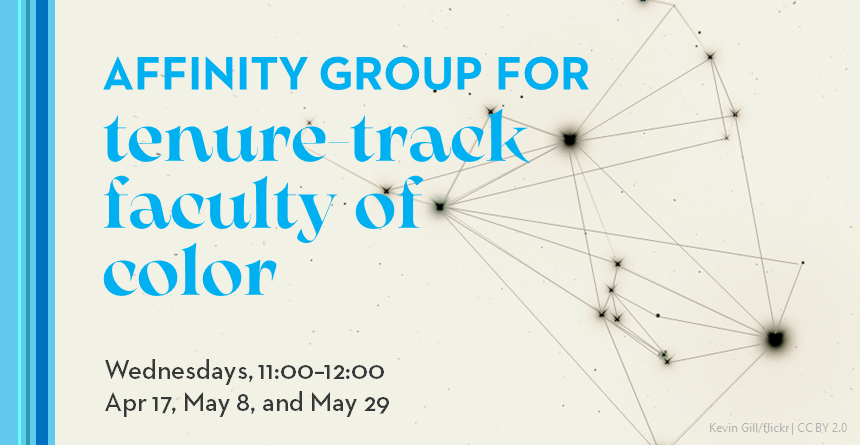
-
24SQ Affinity group for TT faculty of color - details
-
Affinity group
Wednesdays: Apr 17, May 8, and May 29 | 11:00–12:00 | In person | Wismer Center (LOYA 200) | Coffee and tea provided
Co-sponsored by the Office of Diversity and Inclusion
Facilitated by Colette Hoption
The Center for Faculty Development and the Office of Diversity and Inclusion are excited to announce the continuation of an affinity group for tenure-track faculty of color. The purpose of convening the group is to provide a space for the collective exploration of the impact of race, power, and privilege on the academic life of colleagues immersed in teaching, scholarship, and service at pre-tenure stages of their careers.
Why create a group for tenure-track faculty of color?
There are three primary reasons. First, the Task Force on Diversity and Inclusive Excellence report recommends boosting our capacity to retain talented minoritized faculty and facilitate professional development opportunities. Second, research on affinity groups indicates they enhance participants’ agency and optimism, while providing access to beneficial information and support. Third, from our own conversations with members of the Seattle University community, we know that faculty of color need a space where they can discuss their unique experiences in a supportive environment with peers who are similarly situated.
This professional development opportunity aims to empower tenure-track faculty of color to build community, share experiences, and pursue their academic life with more confidence and agency. We hope that this caucus process gives participants the space to determine “what solidarity could look like for...as people of color committed to the work of social, racial, and gender justice” (Kad Smith, Compass Point) at Seattle University.
» Register
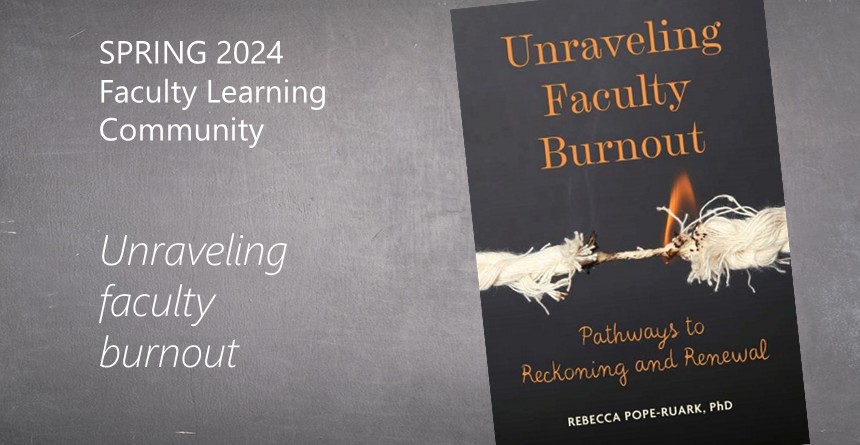
-
24SQ FLC Unraveling faculty burnout - details
-
Faculty Learning Community
Unraveling faculty burnout: Pathways to reckoning and renewal
In an academic culture that values productivity, competition, and external recognition, it is unsurprising when faculty find themselves stressed, overwhelmed, and weary. Left unchecked, these feelings can lead to burnout, characterized by energy depletion, work-related apathy or cynicism, and feelings of inadequacy.
In this learning community, we will read Unraveling Faculty Burnout, a book by Rebecca Pope-Ruark, who explores how we can reframe our experiences and conversations to mitigate burnout, specifically addressing the stressors unique to female and female faculty of color. From the book:
Pope-Ruark “helps faculty not only address burnout personally but also use the tools in this book to eradicate the systemic conditions that cause it in the first place. As burnout becomes more visible, we can destigmatize it by acknowledging that women are not unraveling; instead, women in higher education are reckoning with the productivity cult embedded in our institutions, recognizing how it shapes their understanding and approach to faculty work, and learning how they can remedy it for themselves, their peers, and women faculty in the future.”
In this three-session Learning Community, facilitated by Samantha Hoang (Mechanical Engineering) and Michelle DuBois (Biology), we will discuss strategies and practices to counter burnout. In this space we invite faculty to engage in open and honest conversations about academic culture that often asks us to hide our failures, lulls, and periods of low productivity.
What can you expect?
Over the three sessions, you'll learn about the “four pillars of burnout resilience,” as discussed in the book:
- Re-discovering your purpose and sense of meaningful work
- Practicing compassion for yourself and others
- Deepening connections with peers and mentors
- Re-establishing realistic balance through self-care and setting boundaries
Who is it suited to?
This learning community is open to all faculty, though the book's author tends to focus on female faculty and female faculty of color.
Unraveling Faculty Burnout is 256 pages long, and reading will be split across the three sessions to be manageable for participants.
What are the dates?
This learning community meets in person on:
- Thu, Apr 18 | 2:00–3:15 | Wismer Center (LOYA 200)
- Thu, May 2 | 2:00–3:15 | Wismer Center (LOYA 200)
- Thu, May 16 | 2:00–3:15 | Wismer Center (LOYA 200)
Coffee and tea will be provided for all sessions.
» Register
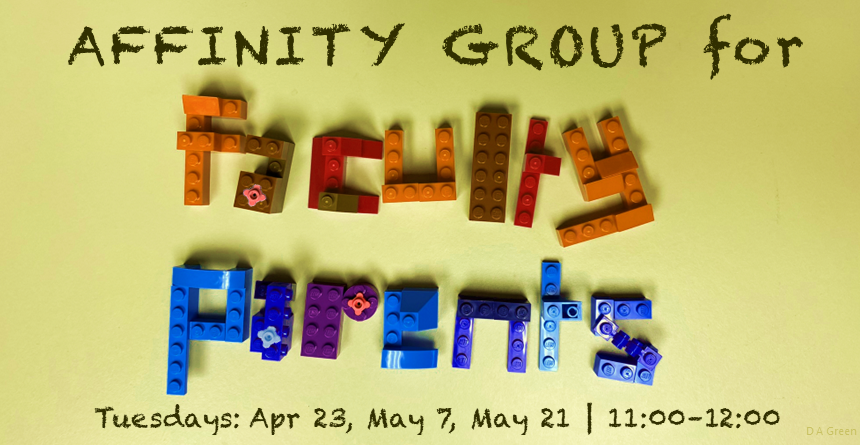
-
24SQ Affinity group for faculty parents - details
-
Affinity group
Tuesdays: Apr 23, May 7, and May 21 | 11:00–12:00 | Via Zoom (with the final gathering in-person) | Zoom link provided upon registration
Facilitated by Brooke Gialopsos (Criminal Justice, Criminology, & Forensics)
The Center for Faculty Development will offer an affinity group for faculty parents of school-age children. The challenges of parenting while maintaining a schedule of teaching, research, and/or service to the university is well-known. Finding a community of parents seeking balance can be a critical source of support and solace. In this space we will empathize, explore, and problem-solve the unique trials faced by faculty who have children in their care.
Why an affinity group?
The psychological benefits of convening groups of people around common identities and experiences are well known. Research on affinity groups has shown that they enhance agency and optimism, while also providing access to beneficial information and support.
Aims of the group
At its most basic level, we hope that this group offers a space where you can feel less isolated in your experience. We hope to foster a community of support amongst faculty parents, where they can share experiences, offer suggestions, and explore how to navigate shared challenges.
*Note: if you are interested in this group but cannot make the time scheduled, please email faculty-development@seattleu.edu and let us know. We would like to support all faculty parents and will work with you to find ways to offer support.
» Register

-
To the swings we missed - details
-
Reception Event
To the swings we missed: A celebration of risk-taking in the Academy
Thu, Apr 25 | 3:30–5:00 | In person | Loyola 201 | Appetizers, beer, wine, and non-alcoholic beverages will be served
Co-sponsored by the Center for Faculty Development, Office of Sponsored Projects, and the Center for Jesuit Education
Hosted by David Green, Colette Hoption, Katherine Raichle, and Andrea Verdan
Spring is typically the time of year when universities around the country are looking back and toasting the successes of the past 12 months.
Less celebrated – but no less important – are all those instances of risk-taking over the past 12 months that didn’t lead to the results we had hoped for, such as
- Articles, chapters, and conference papers that were rejected
- Learning activities, assignment designs, and course designs that didn't work as intended
- Grants, fellowships, and funding applications that didn't come through
- Applications that were turned down
- Conference sessions that no one showed up for.
Academia is full of such moments, yet we rarely acknowledge them publicly. As author Helen Sword (2017, p. 178) writes, “habitual risk takers understand that failure, too, is worth celebrating,” and with that in mind, the Center for Faculty Development, Office of Sponsored Projects, and Center for Jesuit Education are co-sponsoring this celebration of risk-taking. This is a chance for us to toast our valiant efforts, recognizing that – to quote Einstein – “Failure is success in progress.”
For this informal reception and celebration to go ahead, we need confirmation of at least 30 “swings that were misses” from attending faculty. So when you register, be sure to let us know what miss(es) we can anonymously add to the list.
» Register

-
24SQ Course design with constructive alignment - details
-
In-Person Workshop
Strong yet flexible: Course design with "constructive alignment"
Wed, May 1 | 11:00–12:30 | In person | Loyola 201 | Coffee, tea, and snacks provided
Co-facilitated by David Green and Katherine Raichle
Designing (or redesigning) a course can be overwhelming, and we are often unsure where to begin. What content should I include in my course? What do I want my students to do with the content in the course, and beyond? How will I assess my students?
In this session, we’ll address these questions. You will learn how to create an overarching course structure informed by the “constructive alignment” model of course design from the higher education research. This model provides a road map for course design that clearly aligns the learning outcomes that you have identified for the course with relevant learning and teaching activities and graded assignments.
This type of course design will provide a clear and manageable structure for you and your students in the course, as well as promoting their best learning. You’ll finish the session having made concrete progress in designing and/or redesigning a course.
In this session, you will learn how to:
- identify suitable learning outcomes for your course.
- design activities that link with your learning outcomes.
- develop graded assignments that align with your learning outcomes.
- align all of the above under a coherent course design structure.
» Register
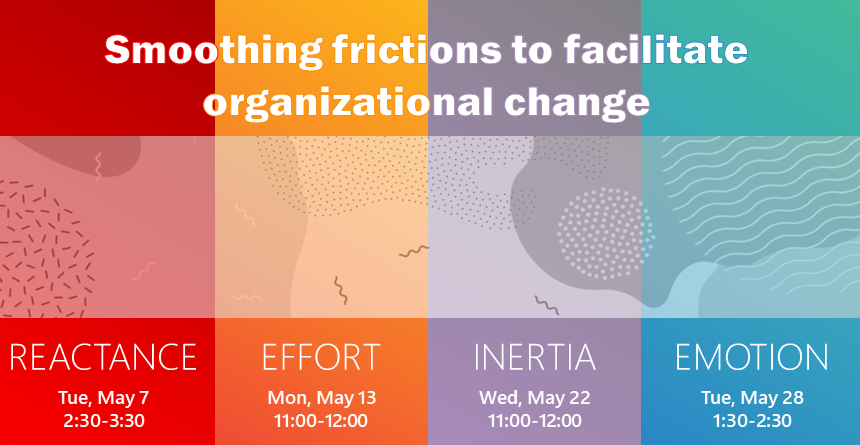
-
24SQ Smoothing frictions to facilitate org change - details
-
Self-Assessment Exercise and Workshop
Smoothing frictions to facilitate organizational change
Co-sponsored by the Center for Faculty Development and Reimagine & Revise the Curriculum
Co-facilitated by Colette Hoption and David Green (Center for Faculty Development)
Some of the best ideas in organizations are never realized because of four common forces or “frictions:” inertia, effort, emotion, and reactance.
Based on the book, The Human Element, the Center for Faculty Development has developed a self-assessment exercise and corresponding videos to help our community tackle each friction.
Now, we are offering four hyflex clinics (one per friction) to raise questions, share experiences, exchange ideas, and problem-solve around each friction. These are ideal spaces for fine-tuning plans for minimizing frictions, unpacking attempts to minimize frictions (whether successful or not), and testing out strategies on a friendly audience. Each clinic will begin by reacquainting participants with their self-assessment scores, and then, open the room for conversation and brainstorming.
By the end of each clinic, you will have:
- Heard examples from peers of how one friction has presented itself in change initiatives here.
- Translated some of The Human Element strategies for our Seattle University context.
- If relevant, developed the next steps in your action plan for ushering in your change initiative.
Who is this workshop suited to?
This workshop is especially suitable for RRC coordinators, department chairs, and program directors, as well as any faculty member who has recently led, is leading, or will be leading a change initiative at Seattle University.
What are the clinic dates?
- Clinic #1: Reactance | Tue, May 7 | 2:30–3:30
- Clinic #2: Effort | Mon, May 13 | 11:00–12:00
- Clinic #3: Inertia | Wed, May 22 | 11:00–12:00
- Clinic #4: Emotion | Tue, May 28 | 1:30–2:30
All sessions are hyflex, with participants meeting in person in Loyola 201 and simultaneously on Zoom. The Zoom link will be provided upon registration.
» Register
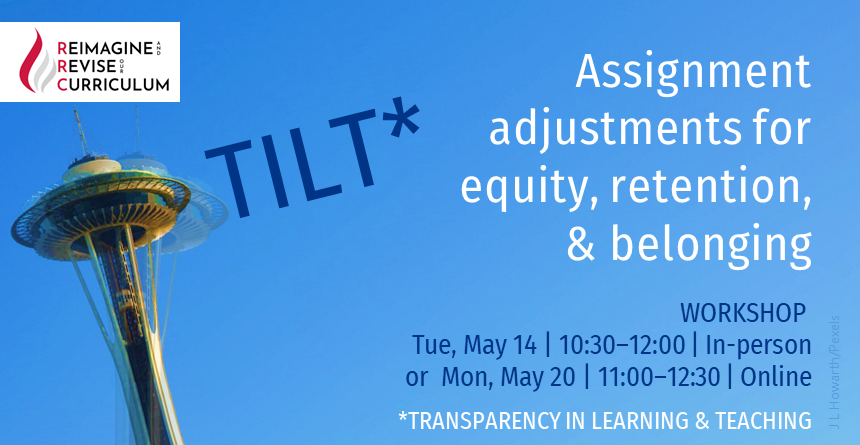
-
24SQ TILT - details
-
Workshop
TILT: Assignment adjustments for equity, retention, and belonging
Tue, May 14 | 10:30–12:00 | In person | Loyola 201 | Coffee, tea, and snacks provided
OR
Mon, May 20 | 11:00–12:30 | Via Zoom | Zoom link provided upon registration
Co-facilitated by Katherine Raichle and Jennifer Marrone (Management)
Transparent Design in Learning and Teaching (TILT) is a teaching approach involving a minor redesign of assignments that helps students better understand how and why they are learning course content.
TILT has been shown to benefit both students and faculty. For students, TILT boosts students’ sense of belonging, retention, and academic achievement, with additional gains in achievement for students from underrepresented backgrounds. For faculty, implementing TILT results in higher-quality student work, allowing faculty to feel greater satisfaction in their grading and teaching, as well as saved time.
Please remember to bring with you a copy of an upcoming assignment to apply the TILT approach to. You might want to focus on assignments where you’re disappointed with students’ performance, where you get a lot of push-back or questions from students, or where you find student motivation lacking.
» Register
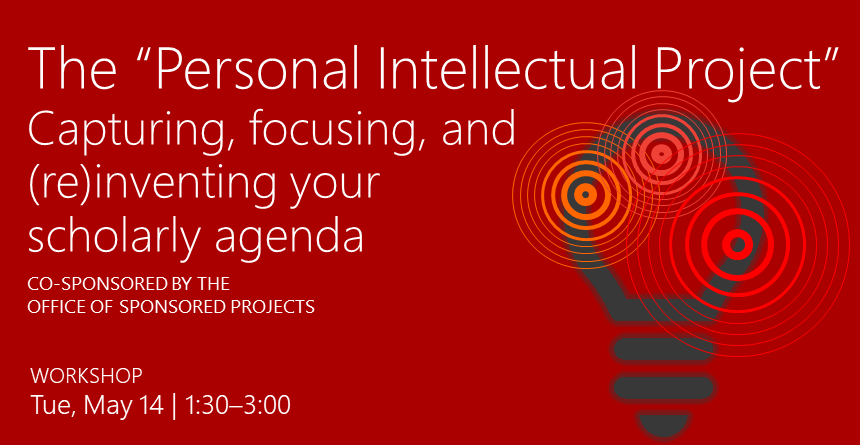
-
24SQ Personal Intellectual Project - details
-
Online Workshop
The "Personal Intellectual Project": Capturing, focusing, and (re)inventing your scholarly agenda
Tue, May 14 | 1:30–3:00 | Via Zoom | Zoom link provided upon registration
Co-sponsored by the Office of Sponsored Projects
Facilitated by David Green
Spring is often the time when faculty are preparing their files for promotion or tenure, or are reflecting on their work to date to help clarify their summer projects.
Yet depending on our career stage, our scholarly agenda can pose a variety of challenges. For many newer scholars, it can be hard to step back and identify exactly what we’re doing – and why it matters. For more seasoned researchers, in contrast, we often find our passions have shifted to new topics, or that we need to reinvent ourselves as scholars in somewhat different academic fields than where we began.
Difficulty in describing our research arc can affect our chances of winning grants, of being promoted, or simply of feeling in control of our own scholarship. It can lead us to take on projects that don’t exactly align with our expertise or intellectual curiosity, and to missing out on those that do.
In this session, we’ll provide a space for you to think through your own “Personal Intellectual Project”—the big-picture encapsulation of your different scholarly topics and agendas. For newer scholars, can you sense its form yet? Do you recognize the parameters you want to set to keep it manageable? For more experienced scholars, has your intellectual project evolved since you last considered it? What has changed and what remains the same? What projects might reignite your enthusiasm?
Through a structured process and through interdisciplinary small-group conversation, you’ll be better placed to advocate for yourself and your scholarship and will have a clearer vision of viable and enticing scholarly topics for the future.
Be sure to have a copy of your up-to-date CV with you for the session.
» Register
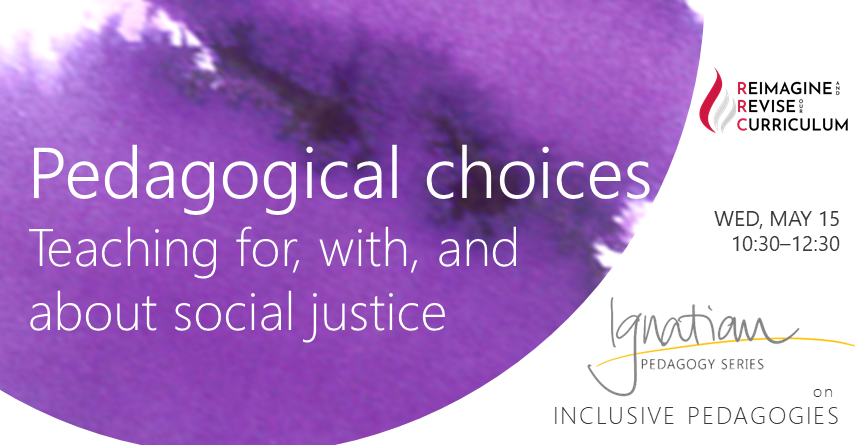
-
24SQ IPS-IP Pedagogical Choices - details
-
Ignatian Pedagogy Series: Inclusive Pedagogies
Pedagogical choices – teaching for, with, and about social justice
Wed, May 15 | 10:30–12:30 | In person | Loyola 201 | Coffee, tea, and snacks provided
Co-sponsored by the Center for Faculty Development, the Center for Jesuit Education, and the Office of Diversity & Inclusion
Co-facilitated by Andrea Verdan (Center for Faculty Development) and Kerry Von Esch (Multilingual/Multicultural Teaching and Learning, College of Education)
As in winter quarter, this spring we are offering individual sessions that combine to make the Ignatian Pedagogy Series on Inclusive Pedagogies. As a participant in this session, you will
- Explore what the higher education literature and Ignatian pedagogical principles teach us about inclusive pedagogies, with a clear focus on racial equity.
- Reflect on the interplay between the personal and the social as they relate to racial justice.
- Develop tools, practices, and strategies aligned with a social justice approach to teaching and learning.
To meet you where you are in your own learning, register for the sessions that are most relevant to you; you do not need to register for all sessions.
This session focuses on pedagogical choices as one of four key aspects of an inclusive pedagogical framework.
In this session, you will explore these questions:
- What does it mean to teach for, with, and about social justice through our pedagogy?
- What might you already be doing in your teaching practice that supports or disrupts inequities?
- What are critical Ignatian pedagogies?
- What tools and practices help foster more just and equitable teaching and learning?
At the conclusion of this session, you will be asked to complete a short, written reflection assignment.
Andrea Verdan, Associate Director for Term Faculty in the Center for Faculty Development facilitates the Ignatian Pedagogy Series. For this session, she will be joined by Kerry Von Esch, Associate Professor of Multilingual/Multicultural Teaching and Learning in the College of Education. This series is co-sponsored by the Center for Jesuit Education and the Office of Diversity & Inclusion.
If you have any questions about the Ignatian Pedagogy Series, please email faculty-development@seattleu.edu or Andrea Verdan (verdana@seattleu.edu).
» Register
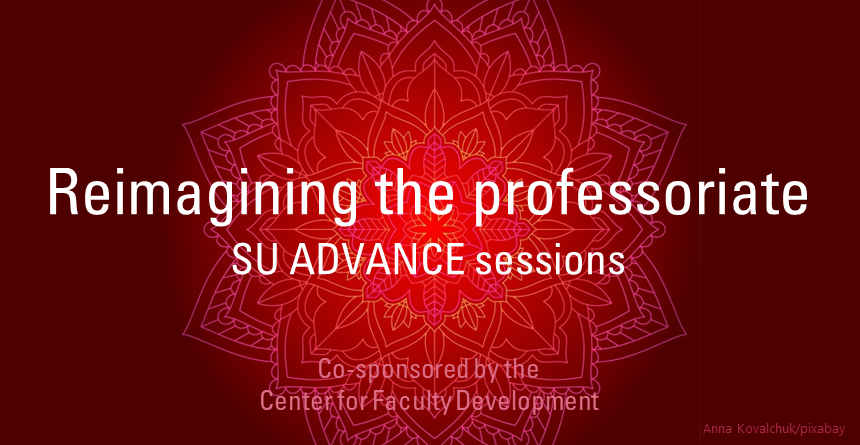
The SU ADVANCE Program seeks to achieve institutional, cultural, and structural transformation that brings faculty promotion standards, perceived expectations, and mentoring processes fully into line with the values-based educational mission of Seattle University.
SU ADVANCE Sessions:
-
24SQ Pathways & Challenges toward Promotions as a FOC - details
-
Workshop series
Pathways and challenges toward promotion to Full Professor as a faculty of color
Spring Quarter workshops: Thu, Apr 4 from 12:00–1:30 & Wed, May 1 from 12:30–2:00 | Via Zoom | Zoom link provided upon registration
Co-sponsored by the SU ADVANCE Program and the Center for Faculty Development
Facilitated by Angelique Davis, professor in the department of Political Science, an SU ADVANCE Fellow, and an NCFDD-trained Faculty Coach (National Center for Faculty Development & Diversity)
SU ADVANCE will host this 4-part workshop series in the 2023–24 academic year to discuss and provide support for the unique challenges and the opportunities experienced by faculty of color who are associate professor in rank.
This series of workshops is designed to support faculty of color seeking promotion to full professor in 2024–25.
» Register
-
24SQ Elevate your academic journey - promotion to full professor - details
-
Online SU ADVANCE Workshop
Elevate Your Academic Journey: Promotion to Full Professor
Thu, Apr 25 | 12:00–1:30 | Via Zoom | Zoom link provided upon registration
Co-sponsored by the SU ADVANCE Program and the Center for Faculty Development
Co-facilitated by Jodi O'Brien (Principal Investigator, ADVANCE grant; Vice Provost for Faculty Affairs) and Colette Taylor (Special Assistant to the Provost for Strategic Directions)
Calling all dedicated faculty members with aspirations of ascending to the esteemed rank of full professor in AY24! This SU ADVANCE Promotion Workshop is tailor-made to guide you through every step of the promotion process. At this spring workshop, participants will delve deep into the intricacies of the updated guidelines and submission requirements, aligned with the latest policy shifts. Gain invaluable insights that will empower you to navigate the promotion journey with confidence and clarity.
Led by Vice Provost Jodi O’Brien, this workshop offers the opportunity to unlock the secrets of crafting a compelling promotion dossier that highlights your accomplishments and contributions effectively. Don't miss out on this invaluable opportunity to position yourself for promotion success!
» Register